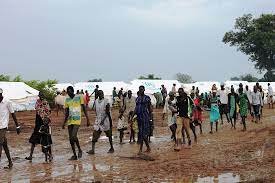Extended transitional Govt in South Sudan due to leaders' failure to implement peace agreement
On September 21, the Transitional Constitution was amended, prolonging the transitional governance arrangements established by the 2018 Revitalized Agreement on Resolution of Conflict in South Sudan.

The UN Commission on Human Rights in South Sudan has reported that the two-year extension of the country's transitional government is largely due to the political leaders' failure to implement the revitalized peace agreement, which is crucial for consolidating peace and protecting human rights.
On September 21, the Transitional Constitution was amended, prolonging the transitional governance arrangements established by the 2018 Revitalized Agreement on Resolution of Conflict in South Sudan. This extension not only delays elections but also postpones vital actions on human rights and peace initiatives.
“Since gaining independence in 2011, South Sudan's unelected leaders have entrenched impunity for severe human rights violations, perpetuated insecurity, and hindered efforts to democratize,” stated Yasmin Sooka, Chair of the Commission. “While addressing civil, political, and socio-economic rights is a fundamental obligation of all governments, South Sudan's leaders have continually failed in this regard. The challenges to a peaceful transition to democracy are manageable if the Revitalized Agreement is implemented as intended. However, the ongoing delays and unwillingness to compromise reflect a self-serving elite more focused on maintaining power and enriching themselves from the nation’s resources.”
The Commission highlighted the dire humanitarian crisis resulting from the leadership's failure to pursue peace, which has led to extreme hunger, food insecurity, and the displacement of over four million people within South Sudan and the surrounding region. Currently, nine million people—approximately three-quarters of the population—lack basic necessities, and vulnerable groups, particularly women and children, are the most affected.
Despite the recent two-year extension of the Revitalized Agreement in August 2022, critical tasks remain unaddressed, including the unification of armed forces, the development of a permanent constitution, the establishment of rule of law and transitional justice mechanisms, and credible electoral arrangements. These elements are essential for promoting and protecting human rights, which are crucial for South Sudan's recovery from prolonged conflict.
Commissioner Barney Afako remarked on the multifaceted crises facing South Sudan, noting that damage to oil export pipelines, connected to the conflict in Sudan, has severely reduced national revenue, even as South Sudan accommodates a rising number of displaced persons. The country also grapples with the consequences of the climate crisis, with both flooding and drought exacerbating the widespread deprivation and displacement of its population.
Commissioner Carlos Castresana Fernández criticized the government's proposed ‘austerity measures,’ pointing out that most civil servants are unpaid, and essential services like schools and health clinics are not receiving adequate funding. “The rampant theft of national revenue continues, leaving South Sudanese citizens questioning where their resources are going and demanding accountability for services that are vital for establishing a democratic society,” he stated.
Recently, lawmakers submitted bills to the President aimed at establishing a Commission for Truth, Reconciliation, and Healing, along with a Compensation and Reparation Authority, as outlined in the Revitalized Agreement. However, the Commission stressed the need for transparency and public participation in these processes, particularly regarding the selection of impartial members for the independent bodies involved in truth-seeking and reparations.
The government has failed to engage meaningfully with the African Union to establish a Hybrid Court, essential for creating an effective criminal justice system and accountability culture in South Sudan. The pervasive impunity for gross human rights violations continues, evidenced by ongoing acts of violence, sexual assaults, abductions, and trafficking.
In a concerning move to reinforce state repression, the government adopted legislation in July 2024 that upholds the powers of the National Security Service, which has been implicated in torture and enforced disappearances. This reflects a troubling disregard for the rights of South Sudanese citizens and undermines prospects for peaceful transitions and credible elections.
The Commission emphasizes the urgent need for South Sudanese citizens to choose their leaders and participate in inclusive processes, such as drafting a permanent constitution and addressing past injustices. Furthermore, the government should ensure that peace processes are participatory and inclusive.
The Commission calls on the African Union, IGAD, and the international community to continue their support for South Sudan, holding the leadership accountable for implementing outstanding transitional tasks. They also stress the importance of transparency and public participation in all processes, ensuring the safety and security of all involved.
- READ MORE ON:
- Carlos Castresana Fernández










